It’s time for another ‘retro review’, where I find a vintage football management video game and see if it’s still as good (or bad) as I remember it.
This is the third part of my ‘EA MAY’ mini-series. Throughout this month, I am picking out a number of titles from EA Sports’ opinion-splitting FIFA Manager series to see how they developed – for better or worse.
This series ran from 1997 to 2013, and for today’s review, I’ve plucked out a game from the middle of this run. Let’s find out if Total Club Manager 2005 really was as special as the man on its cover…
BACKGROUND
Electronic Arts’ football management simulations have had more makeovers and brand changes than David Beckham, and they’ve typically tended to prioritise style over substance. That was definitely the case with FA Premier League Football Manager in the early 2000s, when EA exploited the PL’s licence for all its worth and forgot about producing quality games.
This era ended with the release of FA Premier League Football Manager 2002, in late 2001. That same year, EA poached several employees from German developers Ascaron (who created the Anstoss / On The Ball series in the 1990s) to make a potential successor. Fussball Manager 2002 was released exclusively in Germany, and after receiving a positive reception, the green light was given to an international release the following season.
Total Club Manager 2003 came out in September 2002, but it was the later two games that brought me into this series as a teenager. While I remember enjoying Total Club Manager 2004 a lot more than its successor, I gave away my copy of that title some time ago. That’s why I am today reviewing Total Club Manager 2005.
TCM 2005 was released by EA Sports in autumn 2004, and developed in Vancouver by EA Canada. The studio is best-known for having produced every title in the behemoth FIFA franchise since FIFA 97. Many of the German devs (including former Ascaron head Gerald Köhler) were leading this project, which may explain why some of the English-language translations… aren’t quite perfect.
Adorning the English cover of the DVD case is none other than a fresh-faced José Mourinho. The self-proclaimed ‘Special One’ was at his peak back then, having just begun his glorious first stint at Chelsea after guiding Porto to Champions League glory. Incidentally, the manager on the German cover was Felix Magath, who would have a rather less impressive stay in west London a decade later.
STARTING OUT
It may come as a relief to find that there are no annoying FMV clips at start-up this time, apart from the usual EA Sports title and licensing credits. Instead, you can immediately go into the process of setting up your game, albeit a process that takes much longer than the previous titles.
Several leagues (many of which are fully licensed) are available to be loaded, though if your computer’s not exactly a powerhouse, it may be best to pick only those you’re interested in managing in. You then have three game modes to choose from: ‘Select A Club’ (does exactly what it says on the tin), ‘Play A Career’ (choose one of three randomly-selected clubs) or the brand-new ‘Found New Club’ mode (more on that later).
As well as naming your manager, you can set their nationality, managerial attributes, and age. While Football Manager has a lower age limit to keep things realistic, this isn’t so strict in TCM, so using my actual birthdate would let me manage a Premier League team as a 14-year-old schoolboy (now there’s a sitcom idea)! You can add up to four managers, set the level of difficulty, and decide whether or not you want sackings to be possible.
Your last decisions before selecting your club involve setting your areas of responsibility. You can be a ‘Jack of All Trades’ and put yourself in charge of everything (from team management to finances and facilities), or you can delegate some duties to other staff members. You can change these responsibilities at any time.
Finally, you’ll get to pick which club you will manage, along with a national team if you so wish. Once that’s done, you’ll land at the first menu screen. The ‘news centre’ on the ‘Organiser’ menu allows you to read through any important messages using your ‘Personal Digital Assistant’. (For the benefit of my younger readers, PDAs were digital personal organisers that would soon be replaced by smartphones.)
Besides the ‘Organiser’, the other main menus are ‘Team’ (for squad management, tactics, etc) and ‘Club’ (for financial and other off-pitch matters). Each main menu has a series of sub-menus that you can go through to manage certain aspects of your team or club.
WHAT I LIKED
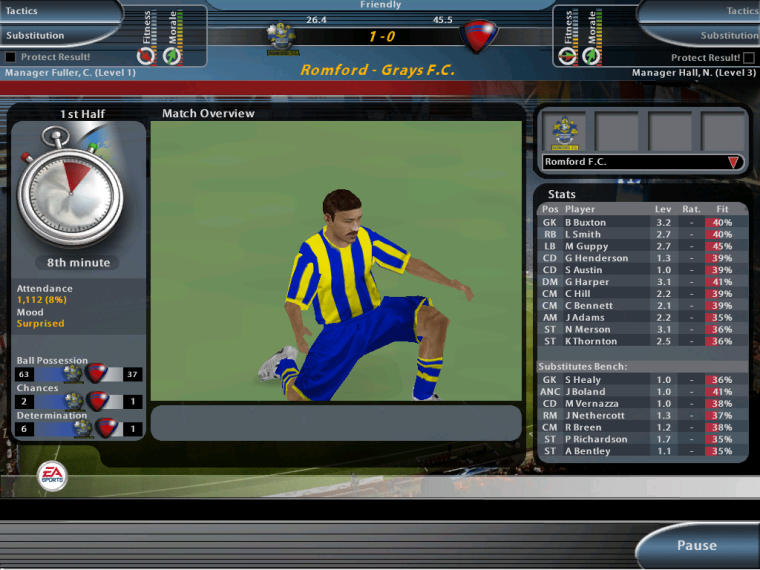
Before I discuss the interface (shudder), let’s focus on some of the positives. Clicking on a player tells you pretty much everything you need to know about them, from their skills to their energy and morale, and even their ‘character’. Players can have up to four positive or negative traits, including High Club Identity (loyal), Super Sub (plays better after coming off the bench) and Hard Man (Roy Keane).
You can also view their position ratings – their Current Level (based on pretty much all the above) and their Potential Level. In this case, ‘potential’ works differently from FM, as it highlights how good a player will be if their form, fitness and morale are all at 100%. For a better idea of a player’s true potential ability, look at their star rating indicating ‘talent’. A 5-star talent could become world-class if developed well, while a 1-star talent may be little more than a mediocre professional.
Speaking of that, one of the things I love most about TCM is youth development. You can track the progress of rising stars at your club from age 11 upwards and offer them professional contracts when they enter the Under-18s squad. You can also build youth camps across the world to help attract the best overseas talents to your club.
When it comes to your senior team, you’ve got an array of training and tactical options to choose from. Pretty much any formation can be set up, and dragging players in and out of the squad is quite straightforward (certainly compared to previous titles).
Matches can be viewed in several ways. You can watch the full match in 3D, which uses the FIFA engine and features some adequate commentary from John Motson and Ally McCoist. The match plays out quite well in 3D if your system is capable, though you can alternatively opt for a classic ‘text-only’ mode (where you can influence play by using ‘shouts’) or generate an ‘instant result’.
‘Football Fusion’ is also available if you have a copy of FIFA Football 2005 at the ready. You can sort out your tactics and whatnot in TCM, and then play out the match in FIFA. This idea is as flawed as it sounds, and the result is a bit like like that Simpsons episode where Bart swaps body parts with a fly. It’s the worst of both worlds, basically, and best avoided.
I also like that you have the option to chat to your players, which – for example – can encourage them to train harder or resolve any issues they may have with certain team-mates. Away from the field, the game still has a neat stadium builder, so you can build that snazzy ground of your dreams if you can afford it.
WHAT I DIDN’T
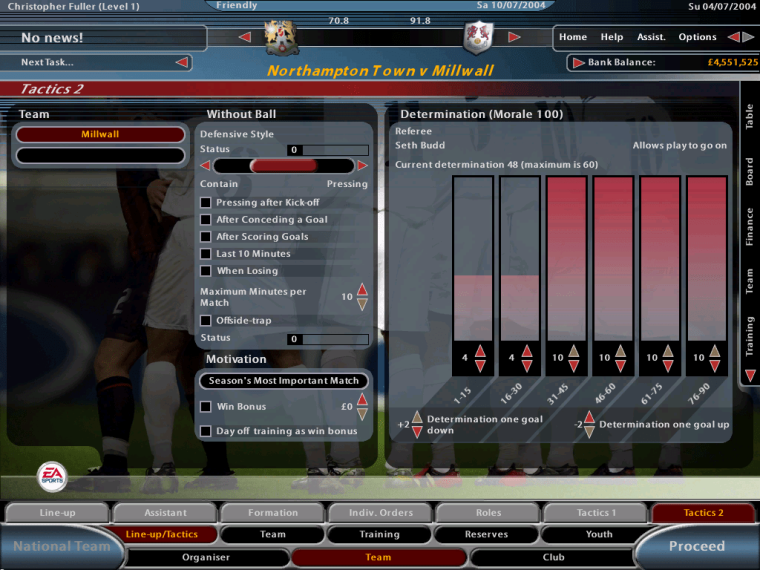
One of the major criticisms of TCM 2004 was about its ‘messy’ and ‘confusing’ interface – an issue that EA sought to address with a major overhaul in TCM 2005. I’m in the minority that actually preferred the older look, which was easier on the eye and felt more consistent. In contrast, the background in TCM 2005 is rather bland, which makes some of the brighter aspects of the interface look garish.
Negotiating menus and sub-menus is still a pain in the backside, though the various pages are clearly labelled. In that respect, it’s definitely a vast improvement on those unintelligible icons from FIFA SM.
I also have issues with some of the tactical options. You can incentivise your players with win bonuses, which is fair enough, but then you can also decide how much determination your team plays with in 15-minute spells. This borders on unnecessary micromanagement for me, even if it can help you pull off an upset against a much more talented team.
Lastly, while hundreds of clubs and thousands of players are fully licensed, managers aren’t covered by EA’s licenses. All bosses and chairmen are randomly generated upon starting a new game. In my Millwall save, for example, Chelsea’s virtual Mourinho was given the rather less Portuguese-sounding moniker of John White. Of course, that can’t really be helped, so for all of EA’s sins, I won’t hold that against them.
WE MUST TALK ABOUT
The ‘Found New Club’ mode. If you’re managing in a certain nation (such as England, Scotland or Germany), you can establish your own club in any of several thousand towns. Just put in some basic info (such as the club and stadium name) and create a badge (or import your own), and your club is born. You can then select your kit colours on the Team menu before beginning your adventure.
At first, you’ll start off as a semi-professional club. The team only plays league matches on weekends, and players will only train a few evenings a week because they have full-time jobs. With a substantial starting budget, though, it perhaps won’t be long before you rise through the three regional leagues and enter the professional ranks (e.g. the Conference in England).
It’s also worth noting that you’re not tied to your created club. If you feel ready for a new challenge after taking your club as far as possible, you can sell the club for a nice profit and move on to manage another team.
While setting up your club, the game will also generate several other clubs to go in your regional leagues. However, you’ll often find that some small towns and villages get multiple clubs (Grays FC and Grays Wanderers FC?!). One anomaly I found after creating my local club was that one team in the top regional league was named Watford FC, which would certainly have alarmed Elton John and co at Vicarage Road!
SUMMARY
While I remember playing TCM 2004 a lot more than this game as a teenager, returning to TCM 2005 over 15 years later was actually quite an enjoyable experience. Looking past its quirks and occasionally needless features, I can see a well-crafted game that feels realistic and isn’t terribly bloated. I might even say that this is the best title in the entire FIFA Manager series.
If you’re intrigued enough to go back to the 2004/2005 season, I’m sure you can pick this game up very cheaply online. The game ran reasonably well on the Windows XP laptop I used to review it, though you may struggle to get it working on newer operating systems. Windows 10 especially hates EA Sports games from this era, so bear that in mind.
FULLER FM RATING: 3.5* – Premier League.
If you’ve enjoyed reading this retro review, feel free to leave a comment below or tweet me @Fuller_FM.
To wrap up this mini-series, I was hoping to to review one of the later FIFA Manager games, ideally either FIFA Manager 13 or FIFA Manager 14. However, I’ve had a lot of difficulty trying to find a legal copy online (specifically one that HASN’T already been activated). Once I can get my hands on one, I’ll be sure to review it for y’all, but that almost certainly won’t be until next month at the earliest.


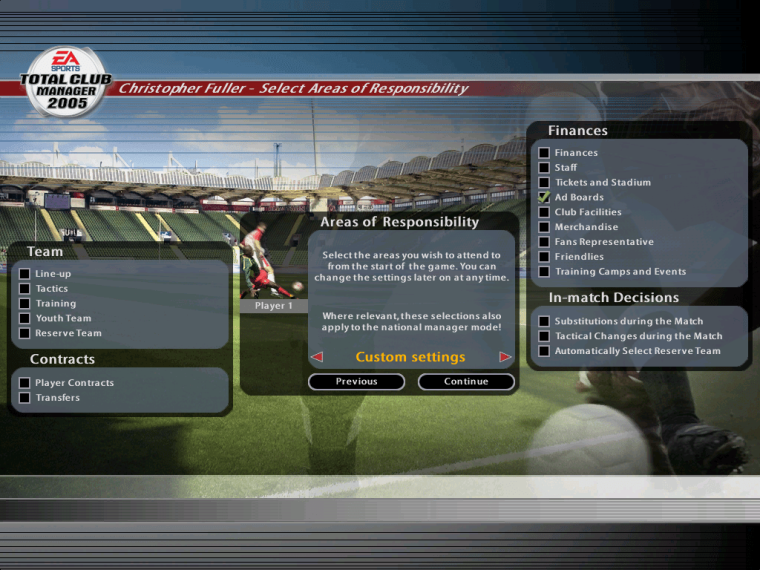
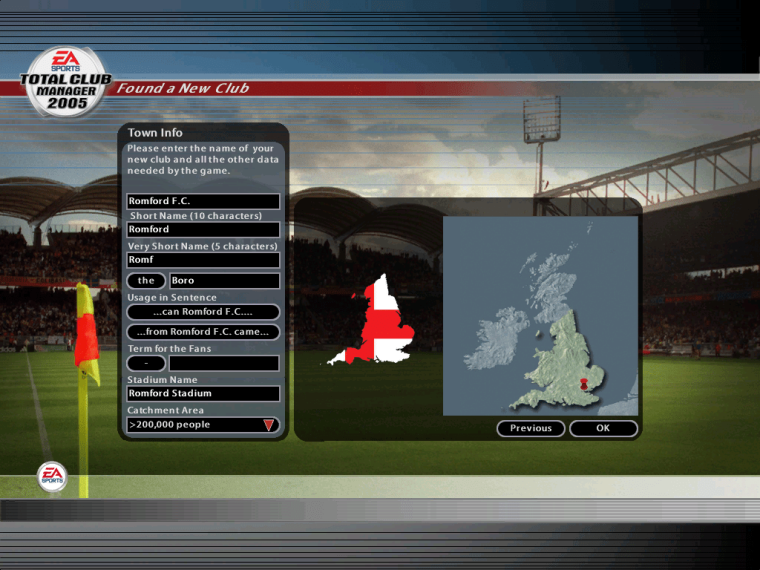
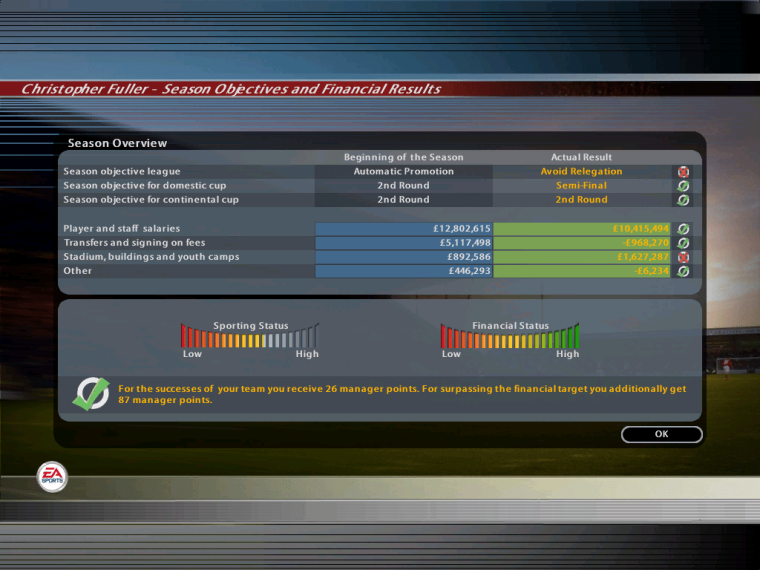
You must be logged in to post a comment.